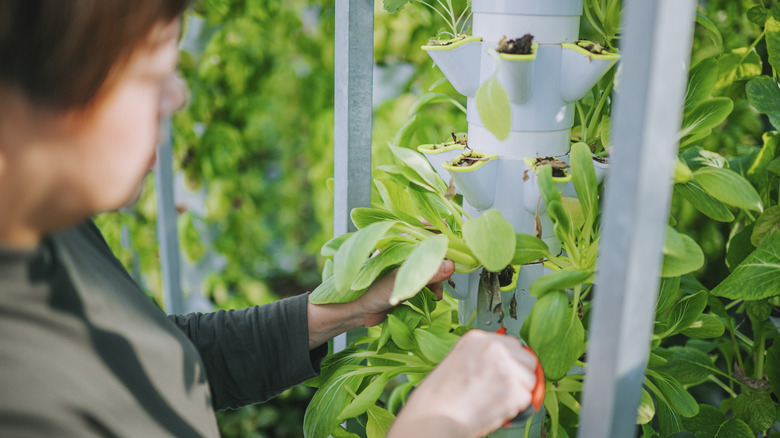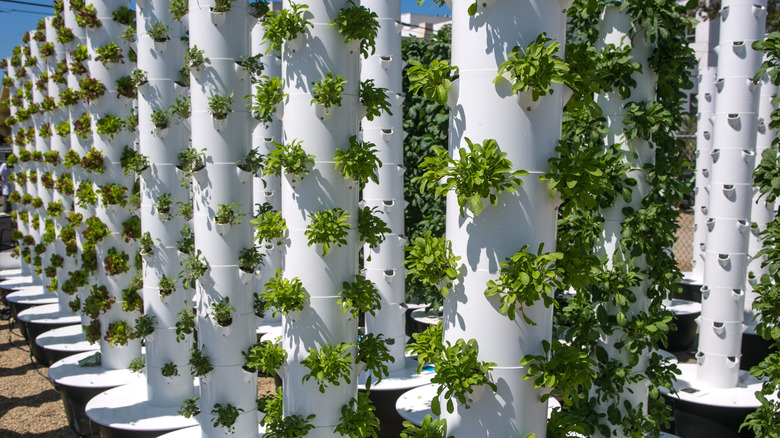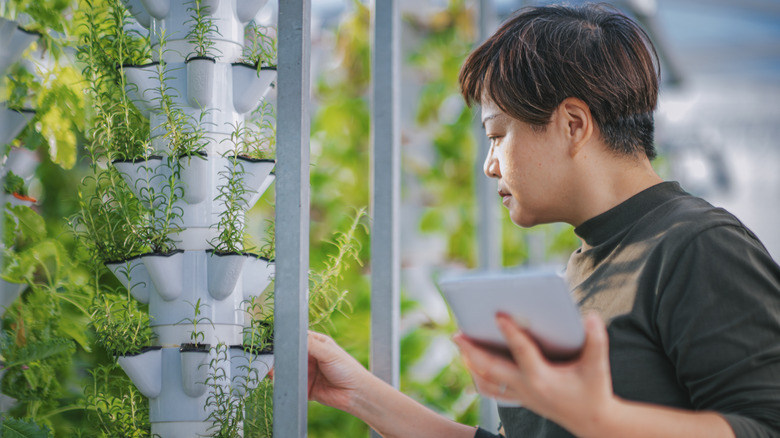Is A Hydroponic Gardening Tower Right For Your Outdoor Space?
If you are looking to create a garden in a cramped outdoor space, you may wonder whether using a hydroponic gardening tower is the best choice. There are pros and cons to making use of this type of setup. Typically, growing food this way is more expensive than producing it in a typical garden space in soil, or just purchasing the vegetables and flowers from a supplier. For some people, the enjoyment and relaxation they receive from growing and nurturing plants makes the added expense unimportant, though. (You may be able to save quite a bit of money by DIY-ing your own hydroponic garden.)
The best reason to make use of a tower farm is because you have a limited amount of space in which to grow your plants. You may not have the ability to use soil to grow your plants, and the hydroponic garden tower means you only need water — no soil.
If you are unfamiliar with what constitutes hydroponic gardening, this setup uses circulating water to feed the roots of the plants. The roots still need access to oxygen and aeration, so you have to create a setup that doesn't drown the roots. You may have to add nutrients to the water supply to keep the plants healthy as well. The remainder of the plant still needs access to fresh air, sunlight, and space to grow, just like it does when it sprouts in soil.
Advantages of outdoor hydroponic gardening towers
The biggest advantage of a tower setup is that it can expand vertically, which means you need less square footage in which to grow plants versus a traditional horizontal soil garden. By using the vertical orientation in your hydroponic garden tower, you also use far less water than in a garden in soil. The recirculation of the existing water throughout the space means that the tower configuration can save up to 95% of a soil garden's traditional water consumption. Water doesn't end up wasted in areas of the soil where no plants are growing, which also can cause weeds to sprout.
Typically, the hydroponic plants will end up being larger when they receive sunlight outdoors versus using grow lights indoors. Because of the increased size, you just need to make sure that the area you are using outside has enough space to accommodate the plants. As an added bonus, your hydroponically grown plants should be ready to harvest up to 50% faster than those grown in the ground, providing the food you want to have sooner.
Versus gardening in soil, you should be able to save some time with a hydroponic setup. You don't have to worry about pulling weeds, because the tower configuration doesn't give these pests a place to start sprouting. Additionally, you rarely will need to use pesticides. Because plants grown hydroponically tend to be larger and stronger, they are able to defend themselves against insects, which reduces the need for pesticides.
Downside to using hydroponic garden towers outdoors
The biggest disadvantage to using a hydroponic tower design to grow your garden is the expense. Don't expect to be able to grow your food for a lower price than you could purchase it in a store or at a farmer's market. You almost certainly won't grow the food cheaper in a hydroponic garden than in a soil garden, either, especially if you are purchasing the tower hardware from a manufacturer, rather than building it yourself.
Additionally, you will have some cost for electrical power to operate the pump that circulates the water. However, by placing your unit outdoors instead of indoors, you save quite a bit of money in operational costs by taking advantage of sunlight, rather than having to use electrical power to operate grow lights. The cost of operating the water pump is about one-fifth the cost of operating the LEDs indoors over an entire month.
When using an outdoor garden tower, you do have to carefully watch the water temperature. If using a hydroponic setup indoors, temperatures remain more constant versus an outdoors configuration. Consequently, it's better to stick to a top feed or flood and drain design in the tower, rather than a system that uses deep water. Because the temperature fluctuations that occur outdoors from daytime to nighttime can greatly change the temperature of the water in the deep water system, you could damage or shock the roots of the plants.


